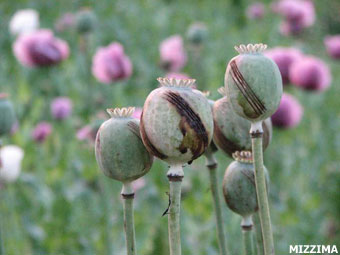A Chinese official says “speed” drugs such as methamphetamine, or “ice,” are significantly on the rise, and China will step up efforts to combat border smuggling.
 The increase is especially noticeable in some border areas owing to “domestic and overseas factors,” he told China Daily on Tuesday.
The increase is especially noticeable in some border areas owing to “domestic and overseas factors,” he told China Daily on Tuesday.
Ma Yan, a vice-president of a criminal tribunal under the Supreme People's Court, said illegal drug making in border areas, particularly southwest China, is causing serious concern.
Yang Wu, a 32-year-old farmer, was among those arrested by poice.
Yang was sentenced to death for smuggling with his accomplices up to 18 kilograms of the new-type “designer” drugs. They transported the drug from Southwest China's Yunnan Province, which borders Burma, and sold them in East China's Zhejiang Province.
Capital punishment is considered in cases involving the production or smuggling of “a large amount of drugs” and for repeat offenders, Ma said, without specifying how many of those convicted have been sentenced to death.
Sun Jungong, a spokesman of the Supreme People's Court, said last year more than one in four dealers among the total 19,000 drug criminals received severe sentences – from five years in prison to the death sentence – 11 percent more than those convicted of other types of crime.
China Daily reported on Tuesday that drug trafficking in the Golden Triangle was on the rise and a crackdown was underway aimed at blocking smugglers from entering the country's western border region.
The Mekong River threads along the Golden Triangle, the border area between Burma, Laos and Thailand, which in recent months has been the scene of clashes between drug runners and Burmese and Thai soldiers who work on the river to ensure the safety of cargo ships.
Xinhua reported in December that Chinese cargo ships departing from Yunnan Province were escorted by five patrol vessels. When they entered a section of the Mekong River on the Laos-Thailand border, a fleet of 10 Thai patrol vessels loaded with armed officers and heavy machines guns waited to escort them to Chiang Saen port in Thailand. An armed helicopter hovered in the sky.
Meanwhile, clashes between Burmese soldiers and a Burmese drug gang led by Sai Naung Hkam occurred on the Mekong River during a joint patrol by Burma and Laos forces. Two Burmese soldiers were killed.
The drug gang was led by Sai Naung Hkam, a former officer in the now defunct Mong Tai Army, which was headed by the late Burmese drug lord Khun Sa, who had a close relationship with former Burmese junta military officers. Residents say Sai Naung Hkam extorts money from cargo ships running on the Mekong River.
On October 31, a four-country meeting between China, Laos, Thailand and Burma was held in Beijing, in which it was agreed to conduct joint law enforcement along the Mekong River.


